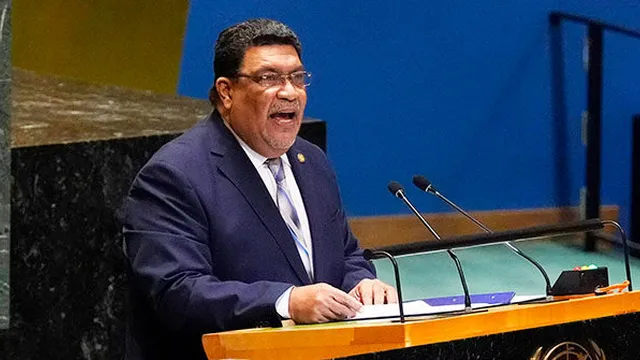
Nicaragua demands climate justice at UN amid global tensions
2024-09-30 00:00- Valdrack Ludwing Jaentschke, Nicaragua's Foreign Minister, spoke at the U.N. General Assembly, aligning with other rogue regimes.
- He condemned capitalism and war, criticized Israel's actions, and expressed solidarity with nations affected by climate change.
- Jaentschke's address highlights Nicaragua's commitment to anti-imperialism and solidarity with like-minded countries.
Express your sentiment!
Insights
Nicaragua's Foreign Minister Valdrack Ludwing Jaentschke delivered a speech at the United Nations General Assembly, aligning his country with other authoritarian regimes like Cuba, Venezuela, and Russia. He characterized Nicaragua as a sovereign and socialist nation while condemning capitalism and war as tools of imperialism. Jaentschke also criticized Israel and its allies for their actions in Gaza and Lebanon, labeling them as genocidal. He expressed solidarity with nations affected by climate change and demanded justice from those he termed 'greedy slavers.' His remarks reflect the Ortega regime's ideological stance and its commitment to anti-imperialist rhetoric, emphasizing unity among like-minded nations to combat perceived global injustices. The speech underscores Nicaragua's alignment with the ALBA bloc and its growing ties with China, particularly in resource management, as the country seeks to position itself as a leader in the fight against imperialism and climate injustice.
Contexts
In recent years, Central America has faced a growing crisis fueled by climate change, with countries like Nicaragua, Guatemala, and Honduras ranking among the most vulnerable to its impacts. The region has been battered by extreme weather events, irregular precipitation patterns, and rising temperatures, leading to widespread food insecurity. From 2018 to 2021, the number of people going hungry in Central America nearly quadrupled, reaching close to eight million. Despite contributing less than 0.2 percent of global carbon emissions, these low-income countries bear a disproportionate burden of environmental degradation caused by wealthier nations. Nicaragua's foreign relations have been shaped by its historical ties and recent political maneuvers. After a tumultuous period marked by the Sandinista National Liberation Front's rise to power in 1979, Nicaragua has navigated complex diplomatic waters, recognizing both the People's Republic of China and the Republic of China at different times. The current government, led by Daniel Ortega, has resumed relations with the PRC, reflecting a shift in alliances that has implications for foreign investment and aid. The European Union's recent declaration of a Nicaraguan representative as persona non grata highlights the tensions surrounding governance and human rights in the country. Corruption and a weak rule of law have plagued Nicaragua, complicating foreign investment and economic stability. As the government grapples with internal challenges, the international community watches closely, urging for democratic reforms and transparency. As climate change continues to exacerbate instability in Central America, the need for a concerted global response becomes increasingly urgent. Halting the flow of migrants northward is not a viable solution; instead, addressing the root causes of climate-induced displacement and fostering sustainable development in the region is essential for long-term stability and prosperity.